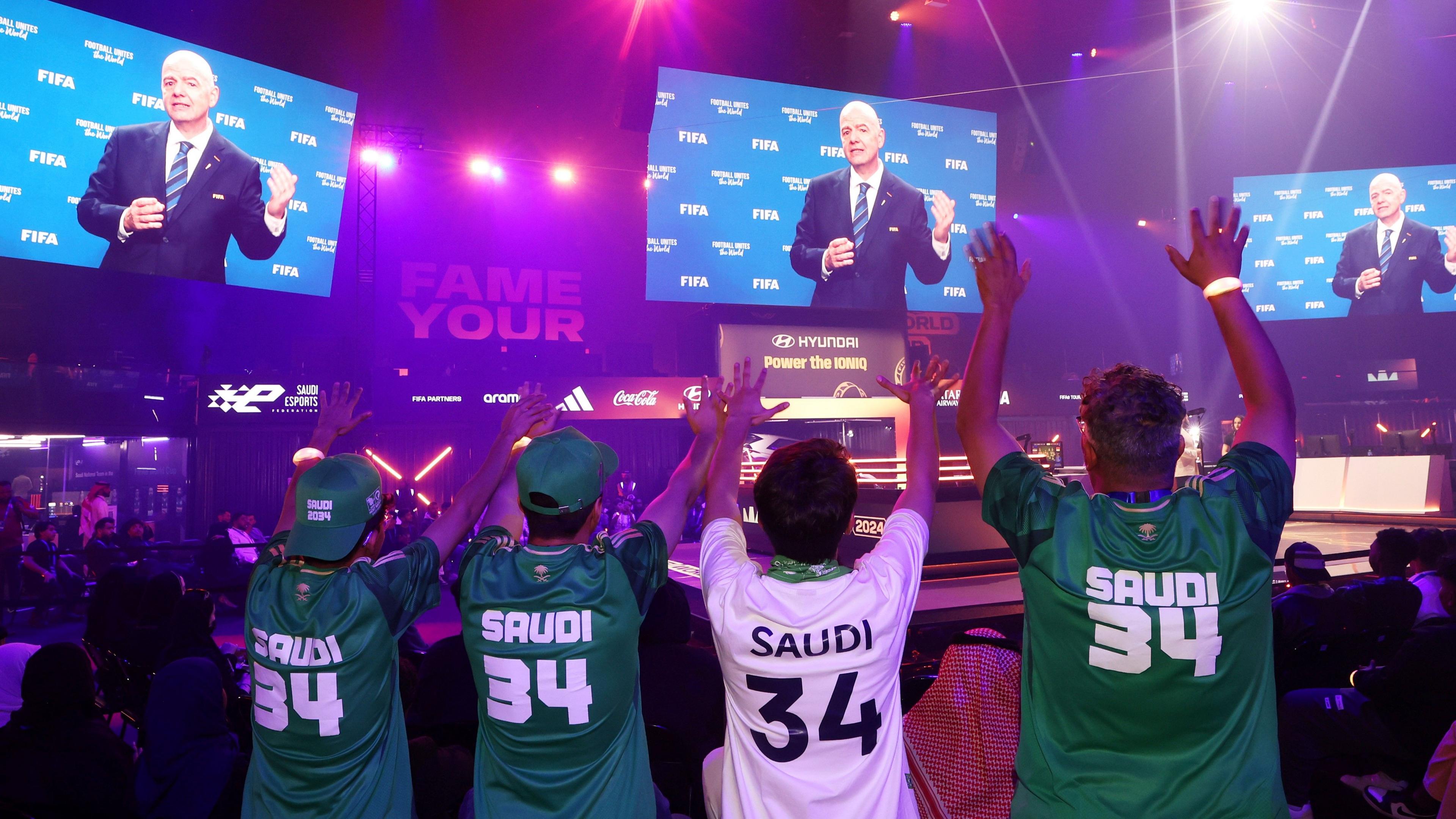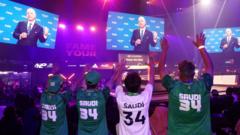
Without the financial backing of Saudi Arabia’s Public Investment Fund, this summer’s Club World Cup could have looked very different
Saudi Arabia’s money appears to be underpinning the revamped Club World Cup.
But why has the country helped to bankroll an event that has struggled to generate interest, drawing criticism for the impact it could have on players, domestic leagues, and the environment?
For those wanting to understand the forces at play over the next month of competition in the US, Miami’s Hard Rock Stadium on Wednesday would be an ideal place to start.
That, after all, is where Real Madrid will kick off their Club World Cup campaign, with new signing Trent Alexander-Arnold set to make his debut.
The fact the Spanish giants were willing to pay Liverpool a reported £8m to secure the defender’s early release so he could play in the tournament is testament to the staggering riches on offer.
With a prize pot of $1bn (£750m), top European teams are in line to earn up to £97m if they win, leading to concerns such money could distort domestic leagues and skew competitive balance.
Real’s Saudi opponents – Al-Hilal – highlight another intriguing aspect of the tournament.
The Riyadh club are owned by the kingdom’s Public Investment Fund (PIF).
But the vast sovereign wealth fund’s involvement in this competition does not stop there.
In December, sports streaming platform DAZN agreed to pay Fifa – football’s world governing body – $1bn for the tournament’s global broadcast rights.
That was not the only surprise, because it also promised to make the live action available for free. This despite Fifa having previously struggled to find broadcast partners, and after DAZN had posted several billion dollars worth of losses over recent years.
Then, a few weeks later, a subsidiary of PIF announced it had acquired a minority stake in DAZN for what it has since confirmed was $1bn – explaining at the time it was “an exciting opportunity to build on DAZN’s significant successes in recent years by bringing more sports to fans and audiences around the world”.
Saudi ties with the Club World Cup strengthened further last week, when PIF became an official partner of an event Fifa president Gianni Infantino claims will “make football truly global”.
In a statement at the time, PIF claimed the sponsorship deal showed it was “at the forefront of growing football”, noting the sport “plays a crucial role in the ongoing transformation” of the country.
But is there more to it than that? After all, Fifa had initially struggled to attract sponsors, and ticket sales for some games have been sluggish, with the event perhaps hampered by a complicated qualification system that means recently crowned domestic champions including Liverpool and Barcelona are not present.
Expanding the event from seven teams to 32 has also sparked a legal complaint from both the international players’ union and the body representing European leagues, who – despite Fifa denials – claim their concerns over a congested calendar and player workload have been ignored.
‘Deeply flawed’
Back in December, just a few days after Fifa announced its “landmark agreement” with DAZN, the governing body confirmed Saudi Arabia as the host of the 2034 World Cup.
But it is not just the timeline that has inevitably led to speculation over a possible connection between Saudi’s investment in the expanded Club World Cup and that hugely controversial decision.
Despite years of scrutiny over its human rights and environmental record, the Saudi bid for the World Cup was unopposed. Australia – the only other potential candidate – decided not to enter the running, hinting it was futile to do so after being given less than a month by Fifa to mount a challenge.
Fifa stood by a fast-tracked process critics argued lacked transparency, and which it was felt effectively paved the way for the Saudis thanks to a decision that only bids from Asia and Oceania would be considered – even though the World Cup had been staged in the Middle East – in Qatar – as recently as 2022.
The sense of inevitability surrounding Saudi’s bid was only reinforced after Fifa’s evaluation report awarded it a record high score.
Ratification was then confirmed by acclamation – in the form of applause – rather than a traditional vote, with only Norway’s football federation abstaining, and criticising the bidding process.
Infantino has defended Saudi’s hosting of football’s 2034 showpiece, insisting it can be a catalyst for social improvements, and Fifa insists it was an open and transparent process.
But others remain dismayed.
Nicholas McGeehan, of football campaign group Fair Square, told BBC Sport the World Cup process effectively acted “to ensure that Saudi Arabia was selected as host”.
“During this deeply flawed bidding process… Fifa sealed a commercially inexplicable broadcasting deal [for the Club World Cup] said to be worth $1bn with an entity that is now part-owned by Saudi Arabia’s Public Investment Fund.
“Fifa does not like the fact that many people look at these facts and conclude that there must be a linkage between them, but had it run a fair and transparent bidding process in the first place it wouldn’t be under this scrutiny.”
Such sentiments are echoed by Infantino’s predecessor Sepp Blatter, who claims the Club World Cup will “over-charge the international calendar”.
Replying to BBC Sport’s questions via his lawyer, Blatter – who remains banned from football until 2028 for breaches of its ethics code – said: “It is obvious that without Saudi’s investment, the Club World Cup could not be organised in the US… it’s only through financial help of $1bn from Saudi Arabia that the [DAZN] coverage of this competition was possible.
“There is no more mystery… Saudi Arabia has taken control of international football.”
In a statement, a Fifa spokesperson rejected the suggestion that investment into the Club World Cup was from one country, saying it now had nine tournament sponsors and that “commercial momentum is strong”.
They insisted that Fifa has “a duty to develop the game globally and this new competition is in the best interests of football”, with all profits redistributed to the clubs through prize money and a $250m ‘solidarity’ programme.
It added that the Club World Cup “is not responsible for calendar congestion”, noting that it takes place once every four years with a maximum of seven matches for the two finalists.
“We believe that this new Club World Cup will mark a turning point for club football worldwide…[it] is an event that football needed.”
What is the Club World Cup?
‘The most streamed sports event ever’
Speaking to BBC Sport from Miami before the Club World Cup’s opening match, DAZN’s emerging markets chief executive Pete Oliver defended the investment in what he calls “a fantastic competition”, insisting it made commercial sense.
“We’ve been looking for a big property to take DAZN to the next step,” he said. “This is an opportunity to establish ourselves as a global platform for football.”
Oliver said it was a “very logical deal” for DAZN, insisting the tournament would “take off” and was generating huge interest in regions such as South America.
“We think this will be the most streamed sports event ever. It will help us build a huge customer database,” he added, pointing out DAZN had recouped some of its outlay by regionally sub-licensing rights to some matches.
Asked about PIF’s subsequent investment in the company, Oliver said: “People always speculate but I can tell you we’re not being used as a pawn or anything like that.
“There was a lot that happened, but these things are not necessarily connected in any way. The investment we had from PIF was around a general investment, but also specifically to establish a partnership for the Middle East and North Africa region.
“We’re an independent company… we’re making our own decisions.”
PIF declined to comment, but sports business expert Callum McCarthy says their investment in DAZN “is expected to result in a Saudi-based sports broadcaster that will rival Qatar’s beIN Sports across the Middle East.
“Saudi Arabia has wanted to own a sports broadcaster for well over a decade and has never really known how to pull it off,” he says. “Fifa needed a global broadcaster for this tournament that could fund this thing, and DAZN now has a direct relationship with Fifa. All three parties have got what they wanted out of the equation.”
‘Marriage of convenience’
Speaking on condition of anonymity, one senior FA source told BBC Sport that Saudi’s support for the Club World Cup was “a marriage of convenience”.
The country – they believe – was always likely to stage the 2034 World Cup regardless of the backing of the Club World Cup, thanks to its unprecedented investment in sport, along with the money Fifa believed it could make by returning to the Middle East after Qatar 2022.
They felt Saudi’s financial backing of the Club World Cup should be viewed as a “bailout” for Fifa, rather than an agreed plan. Fifa, the source said, would have initially been hoping to attract more interest from broadcasters and sponsors, but may have sought help from the Saudis.
“Sport in the kingdom is still largely known for boxing and horse racing,” they said.
“With Al-Hilal involved in the Club World Cup, this helps establish the country as a footballing nation ahead of the World Cup in 2034, in a way that Qatar failed to do for 2022.
“Involvement in the Club World Cup may help tempt some players to join the Saudi Pro League. They’ll be hoping it brings football to a wider public in their own country, and helps to tackle low attendances at some games.”
It is notable that Saudi club Al-Ahli has already booked a place in the 2029 Club World Cup.
‘Opportunity for growth’
Sources close to the Saudi government told BBC Sport the country’s investment is purely based on an opportunity for growth in a new market it can also benefit from, as it develops its own plans to use football to boost the economy, boost tourism and help modernise.
It says it fully concurs with Infantino’s recent claim that if the US and Saudi Arabia could develop their football industries, and there was less reliance on European football, the sport’s annual GDP could double to more than half a trillion dollars in economic impact.
Perhaps this helps explain why Fifa is reportedly already considering a 48-team Club World Cup in 2029 – in line with the expanded men’s and women’s World Cups.
“I think that concept could work, as long as the quality of the teams is high,” says DAZN’s Oliver.
“That could be very exciting.”
That is not how player unions will see such a prospect, as they insist their members are already at breaking point.
Environmental campaign groups are also vehemently opposed to a competition that has gone from seven matches in a single city to 63 matches across 11 cities.
If nothing else, this Club World Cup could reveal just how much more expansion the game is capable of, and willing to accept.







